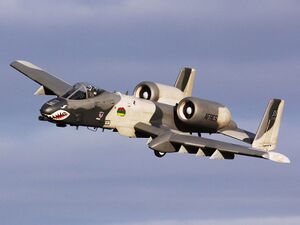A-10Y Urutu
| A-10Y Urutu | |
|---|---|
 A-10Y Urutu in flight | |
| General information | |
| Type | Close air support (CAS) |
| Manufacturer | Navayelle Systems Inc. Fairchild Republic |
| Status | In service |
| History | |
| Manufactured | 2004–present |
| Introduction date | 2004 |
The A-10Y Urutu upgrade program is a modernization project of the Inyurstan Air Force's A-10A Thunderbolt II attack aircraft, spanning a decade from 2004 to the last models being refurbished in 2014. The A-10Y receives its name from the Urutu, or Crossed Pit Viper - a large and hefty terrestrial species of venomous snake. Upgrades have been done to modernize the electronics of the aircraft in order to better defend against the proliferation of missile threats and to better serve the CAS mission.
Upgrades
To enhance and improve upon the A-10's capabilities, several upgrades were performed on the avionics and electronics of the aircraft to better perform the CAS role in the modern battlefield.
FLIR
To remedy previous issues with the A-10 during night missions, the A-10Y has been fitted with a FLIR camera aligned with the GAU-8 Avenger cannon in the front of the plane. Imaging taken by the frontal sensor is manually linked directly to the aircraft's HUD.
Engines
A major problem with A-10's in Inyurstan service were the aging legacy engines, which had been getting older since before the aircraft were even purchased for Inyursta. To remedy the issue, newer CF34-3 engines, the civilian version of the A-10's TF-34 with the exact same capabilities, were used to replace the ancient hardware.
Radar
A critical feature of the A-10Y "Urutu" is the capacity to carry the AEQ/GS-1 (Aerial Electronic Equipment - Ground Search) search & track radar. The AEQ/GS-1 is capable of operating in all weather conditions with heavy battlefield radar clutter. Its range varies depending on altitude, but it can work with AN/ALR-69A missile warning systems to detect, track and engage targets of top priority in a matter of seconds, allowing the A-10Y to utilize its ASM-7 STRIKE missiles at maximum range. The radar is mounted in a large pod beneath the main body of the aircraft.
AEQ/GS-1
Range: 10-28 km
Frequency: Ka band
Modes: Surveillance, targeting, RFI
cued, terrain profiling
Weight: 330lb (150kg)
Missile Warning
The "Urutu" upgrade has been equipped with the Solaris-E, system of multiple infrared and electro-optical sensors around the lower body and wings of the aircraft which work to track missile launches from ground-based or low-altitude (helicopter) systems. The field of vision created by the sensors is roughly 270*, not including information obtained from the forward FLIR sensor or by manual pilot vision. Solaris-E provides warnings against all types of warheads, be they laser-lock, infrared, unguided, etc. It can also help detect and track the origins of AAA fire.
Combat History
This aircraft has seen service in both the Lolloh-Ruolnik War and Greco-Bulgarian War. During the fighting outside of Dekkar, the Urutu's were able to destroy an impressively large amount of modern Lollohian main battle tanks, while it was able to effectively undertake "anti-building" missions against NPLA in urban combat forces in Greece.
Specifications
Crew: 1
Speed: 518mph (833km/h)
Combat Radius: 250nm (460km)
Payload: 16,000lb (7,260kg)
Hardpoints:
- x2 Undercarriage
- x8 Underwing
Armament
Gun: 30mm GAU-8/A Avenger with Depleted Uranium APS rounds & HE rounds
Rockets:
Missiles:
Bombs: